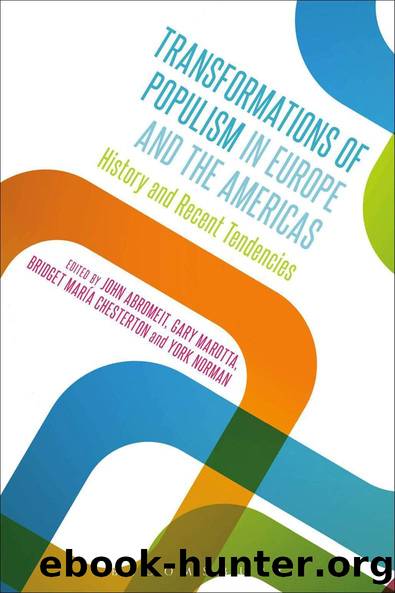Transformations of Populism in Europe and the Americas: History and Recent Tendencies by John Abromeit Bridget María Chesterton Gary Marotta & York Norman

Author:John Abromeit, Bridget María Chesterton, Gary Marotta & York Norman
Language: eng
Format: epub
ISBN: 9781474225236
Publisher: Bloomsbury Publishing
Published: 2015-11-18T21:00:00+00:00
In the wake of the [labor] uprisings, the kinds of substantive state commitments that organized workers had gained in populist pacts in the Spanish American republics and the United States over preceding decades finally made it onto the negotiating table in the British Caribbean: housing and education, the rights to organize and strike [and] a mediating role for the state between labor and capital.111
Ernesto Laclau points out that populism is not an ideology itself but arises âat the point where popular-democratic elements are presented as an antagonistic option against the ideology of the dominant bloc.â112 While the individual leaders discussed above do not cleave to a common ideology, they were fully aware of the potency of a rhetorical opposition between the dominant and the oppressed. Also, though they shared the pressures of the Depression, they worked within, and were products of, the parameters of their society. In this way, their politics resembled the notion of populism elaborated by John D. French, who describes its âmirror-like qualityâ and argues that it âis a movement that maneuvers within but does not direct [the] contradictionsâ of society at large.113
Conceiving of a populist leaderâs approach as a mirroring of society and its contradictions allows for the give and take that occurs in the development of a movement. It also strikes a balance between simplistic explanations of leadership that rely completely on the notion of charisma or that deny a leaderâs agency through reference to the spirit of the time that âproducesâ leaders. This latter perspective characterized Norman Manleyâs assessment of Bustamante. âGreat occasions of trouble in the history of a people demand and create leaders,â Manley said, and Bustamante was âthrown upâ by the people in the crisis of the 1930s.114 In many ways, âgreat occasions of troubleâ also produce new groups, or reconstitute their identities. This helps explain why so many leaders in the circum-Caribbean emerged at the same time and with such similar styles.
Ideas, policies, and approaches moved around the region with migrants, public intellectuals, and labor organizers. The nations and colonies of the circum-Caribbean shared similar reactions to the acute economic downturn of the 1930s, and new leaders reached out to formerly excluded segments of the population. These groups included the important participation of sectors related to agrarian production, both farmers and workers. Populist leaders also creatively reimagined national racial identities. For Mexico, this meant an inclusive mestizaje. For the Dominican Republic and Cuba, it meant excluding neighboring peoples. And for the British West Indies, partially reacting against rejection by the Hispanophone Caribbean and the United States, it meant a newly valorized form of blackness.
Download
This site does not store any files on its server. We only index and link to content provided by other sites. Please contact the content providers to delete copyright contents if any and email us, we'll remove relevant links or contents immediately.
Women and Jewish Marriage Negotiations in Early Modern Italy by Howard Tzvi Adelman(460)
Warrior King by Wilbur Smith(425)
The Battle of Austerlitz by 50minutes(316)
18 real-life stories of serial killers and murderers with solved and unsolved killings from the USA, UK, Europe, and beyond. by Ben Oakley(313)
Youth, Heroism and War Propaganda: Britain and the Young Maritime Hero, 1745â1820 by D. A. B. Ronald(306)
Violence and Emotions in Early Modern Europe by Susan Broomhall;Sarah Finn;(305)
Who's Who in the Zulu War, 1879: The British by Adrian Greaves Ian Knight(303)
The American Crisis by Unknown(296)
The Seeker by S. G. MacLean(250)
The Origins of French Absolutism, 1598-1661 by Alan James(247)
The Dutch East India Company and British East India Company: The History and Legacy of the Worldâs Most Famous Colonial Trade Companies by Charles River Editors(238)
The Traitor of Colditz by Robert Verkaik(234)
The Thirty Years War â Complete by Friedrich Schiller(227)
Fires of Faith by Catholic England under Mary Tudor(223)
A Genius for Confusion by Richard M. Fried(222)
Interest and Connection in the Eighteenth Century by Jacob Sider Jost(221)
The Slave Trade in Africa by Simon Webb;(220)
Invisible Worlds by Peter Marshall(219)
The Opium Wars: Exploring the Addiction of Empires from Beginning to End by Ramos Adrian & Compacted History(216)
